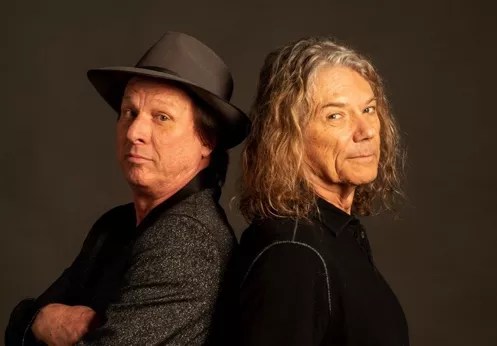
Courtesy Adrian Belew

Audio By Carbonatix
Legendary guitarist Adrian Belew first heard Talking Heads in concert at the tiny Exit/In in Nashville. And likely the first time Talking Heads members heard Belew was in 1978, when he was playing lead guitar with David Bowie at Madison Square Garden in New York City. “They were in the front row,” Belew recalls, “and I think that’s how they first heard me.”
But Belew’s relationship with Talking Heads really took off when the band went on tour in support of Fear of Music, its Grammy-winning dive into psychedelic new-wave music with producer Brian Eno.
“At that time, I lived in Illinois. They played three shows in Illinois. I went to all three of them, and naturally they brought me backstage and wanted to talk to me and stuff,” Belew says. “On the third show – which was in Macomb, Illinois – they asked me to come out and play their encore, which was ‘Psycho Killer.’ I said, ‘Of course, I know the song, but I don’t know the chords or anything. They said, ‘That’s okay; just freak out at the end like you do.'”
Talking Heads was about to make perhaps the most ambitious and powerful music of its career, and all it lacked was an ambitious, powerful and truly out-of-the-box lead guitarist. The band liked Belew’s “freakouts” so much that Eno, singer/guitarist David Byrne and multi-instrumentalist Jerry Harrison attended one of his solo shows, then begged him to play on a new Talking Heads album they were working on.
“After the show, they cornered me in the stairwell and said, ‘Hey, we’re making a record. Could you please play on it?’ I said, ‘Well, I’m supposed to fly back to Illinois tomorrow,’ and they said, ‘Could you please just come in for maybe even tomorrow?'” Belew remembers. “And I said, ‘Absolutely.'”
Everything Belew played on Remain In Light was recorded in that one day. That’s the kind of spontaneity and creativity you might expect from a musician who was discovered playing his unique, angular, atmospheric lead guitar just a few years earlier by Frank Zappa in Nashville and soon found himself playing with some of the most interesting acts in popular music: King Crimson, David Bowie, Paul Simon, Herbie Hancock and, yes, Talking Heads.
And now Belew is joining forces with Harrison again, as he and the Talking Heads veteran prepare to take the road with veterans of Turkuaz for a tour inspired by the Remain in Light era. The project rolls into the Ogden Theatre on Thursday, February 16, and the Boulder Theater on Friday, February 17.
Belew added weird, beautiful lead guitar to Remain in Light, and had his big moment – or several big moments – on the fast-paced Afro-rocker “The Great Curve.” But the biggest compliment to Belew’s guitar playing was the band’s trust in him – all for songs that would make up what’s considered Talking Heads’ greatest studio album.
“At that point, they had nothing done except sort of bass-and-drum tracks,” Belew says. “They said, ‘Well, we want you to play things, and we’ll write the songs around the places that you play.'”
A lot of musicians would be intimidated by that statement – especially coming from a talented and famously intellectual group at the creative height of its career. But Belew took flight.
“As I was setting up my gear and going through my sounds, I could see through the control-room window that they were jumping up and down with joy,” he remembers. “I could tell they were enjoying what I had to offer before I even played. I played a guitar solo after about two minutes or so [of listening to the basic tracks], and they went nuts over it. I could see them. I waited a minute and played another solo, and that song became ‘The Great Curve.’ That’s how the whole record went.”
Eno and Bowie had utilized the guitarist in a similar way on Bowie’s 1979 album, Lodger, but there’s something about Belew – and avant-garde horn player Jon Hassell, too – that works with Remain in Light in a more apt and even magical way.
Belew’s relationship with Talking Heads extended into the group’s “orchestral funk” era on the road internationally, too. That ten-piece, Afro-new-wave sound is showcased in the second half of 1982’s The Name of This Band Is Talking Heads, with Belew on lead guitar, Busta “Cherry Jones” on second bass, and Bernie Worrell (a founding member of Parliament-Funkadelic) on keys. But a searing, almost spiritual performance in Rome during that Talking Heads “big band” era is considered the group’s peak by many fans. Not only does Belew agree, but he says that the widely available video of that 1980 Rome show inspired the upcoming Remain in Light tour.
“Jerry and I had talked for several years about doing something to try and revisit the 1980 Rome show that’s on YouTube,” Belew says. “So many people love that show. We couldn’t figure out how to actually do that. It seemed so daunting. But then he produced a band called Turkuaz, and Turkuaz is a band that started ten years ago based around Talking Heads. That was their favorite music. So they were a big band and they could cover all the material. Jerry called me and said, ‘I think I have a band here that’s perfect for this.'”
With the Colorado dates for his tour quickly approaching, Belew says this music is exactly what the world needs right now: “It’s a big, rhythmic, pumping, happy, joyful sound.”
Jerry Harrison & Adrian Belew Remain in Light Tour, 8 p.m. Thursday, February 16, Ogden Theatre, 935 East Colfax Avenue, and 8 p.m. Friday, February 17, Boulder Theater, 2032 14th Street, Boulder. Tickets to either show are $45.